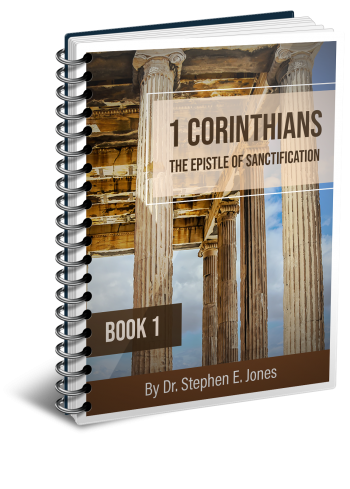Latest Posts
View the latest posts in an easy-to-read list format, with filtering options.

An in-depth commentary/study on the first 6 chapters of First Corinthians.
Category - Bible Commentaries

Paul expected believers not only to have faith and to exercise spiritual gifts, but also to grow to spiritual maturity and to learn the laws of God, so that they could resolve disputes within the assembly. He did not want them to need the law courts of ungodly cities that judged the people by the laws of men. So he says in 1 Cor. 6:4-6,
4 If then you have law courts dealing with matters of this life, do you appoint them as judges who are of no account in the church? 5 I say this to your shame. Is it so, that there is not among you one wise man who will be able to decide between his brethren, 6 but brother goes to law with brother, and that before unbelievers?
Paul chided the church for not having a “wise man” who could judge internal disputes. But it is unclear what the Corinthian church had actually done about this problem. Had the church set up an unqualified judge, one who was “of no account in the church” (NASB)? The Emphatic Diaglott suggests this view by calling them the “least esteemed in the church.”
But in verse 6 Paul chided them for taking their cases to the law courts of unbelievers—that is, to judges outside the church.
If he was suggesting that the believers were settling their disputes in the Roman law courts, then the Roman judges were the “judges who are of no account in the church.” Gallio, the proconsul mentioned in Acts 18:12, was the esteemed judge in the Roman province of Asia, but he was neither the pastor nor an elder in the church.
It may be that those in dispute had no confidence in the judge that the church had set up to judge the case, so they presented their cases to the Roman law courts.
Whatever the case, it was to their shame that they could not find a “wise man” within their assembly who was qualified or was held in high enough esteem to judge their internal disputes.
Paul continues in 1 Corinthians 6:7, saying,
7 Actually, then, it is already a defeat for you, that you have lawsuits with one another. Why not rather be wronged? Why not rather be defrauded?
The Corinthian believers should have been embarrassed to air their grievances in a public law court for all to hear. First, for one believer to accuse another in public would reflect badly on the church itself, for the unbelievers would then understand that to believe in Christ had little or no power to change human nature.
Paul suggests in this verse that one of the believers was being accused of defrauding another believer. That was bad enough, but the problem was compounded by the fact that believers were unable to settle the issue, either personally or by the arbitration of a church judge. That in itself was a great “defeat.” But to take the case to the judge in the city made the defeat still worse by advertising it to the whole city. It would have been better, Paul said, to suffer injustice. Surely, the man’s loss was not so great that it warranted a public shame on the whole church!
Paul then deals with the more fundamental problem of unrighteousness among the believers themselves. He says in 1 Cor. 6:8,
8 On the contrary, you yourselves wrong and defraud, and that your brethren.
The Emphatic Diaglott renders it this way:
8 But you injure and defraud—even these things you do to brethren.
Paul continues in 1 Corinthians 6:9, 10,
9 Or do you not know that the unrighteous shall not inherit the kingdom of God? Do not be deceived; neither fornicators, nor idolaters, nor adulterers, nor effeminate, nor homosexuals, 10 nor thieves, nor the covetous, nor drunkards, nor revilers, nor swindlers, shall inherit the kingdom of God.
This is not a complete list of unrighteous acts, of course. It is a partial list, derived from the divine law, because sin is “crime,” a violation of God’s law. Paul was not saying (as so many think) that any believer who sins will go to hell or be lost forever. In fact, since Paul mentions “fornicators” here, it is clear that he was including the man who was having relations with his father’s wife (1 Cor. 5:1). That man was to be delivered “to Satan for the destruction of his flesh, that his spirit may be saved.”
If such fornicators could be saved, then the others would also be saved, though they may be excluded from the local assembly. Excommunication does not mean that they were lost forever. It just meant that they needed some disciplinarian action to destroy the flesh—that is, to teach the person to walk by the spirit, rather than by the soul.
So what did Paul mean when he said that “the unrighteous shall not inherit the kingdom of God?”
All believers are justified by faith, but not all believers will inherit the Kingdom. We see this in the example of “the church in the wilderness” (Acts 7:38, KJV) under Moses. All Israel (including many Egyptians who came with them who were called “the mixed multitude” in Exodus 12:38) were justified by the blood of the lamb when they kept the Passover in Egypt. In other words, they were all believers who responded to the call of God to leave Egypt.
But how many of these actually inherited the Kingdom of God? Only two of them, it seems: Caleb and Joshua.
The nation was the church at that time. God baptized them at the Red Sea, and they even had an opportunity to become Spirit-filled believers at Mount Horeb. They rejected the Holy Spirit on that occasion, so they did not have the faith necessary to enter the Kingdom under Joshua. If they did not enter the Kingdom, then they certainly did not inherit the Kingdom when Joshua divided the land among the tribes and each family.
The story of Israel in the wilderness shows us how only a minority of believers in the church will actually be inheritors. To believe, in itself, is not to inherit. One must be an overcomer to inherit. One must follow the example of Caleb and Joshua to be an inheritor. Even if we broaden our view to include all of the next generation of Israelites who actually crossed the Jordan under Joshua, we see how they had to be circumcised (Joshua 5:7) before they could inherit the land.
During the Old Covenant era, physical circumcision was required as a prophetic type of a greater circumcision that was yet to come. Hence, it spoke of heart circumcision, which Moses himself foretold (Deut. 10:16; 30:6). Since the cross was central to heart circumcision, it is no stretch to equate Israel’s circumcision with Passover—especially since the Israelites’ circumcision occurred at the time of Passover, shortly after crossing the Jordan (Joshua 4:19; 5:10).
We may conclude, then, that the generation of Israelites who entered the Kingdom (by crossing the Jordan), were able to inherit the Kingdom, first because they were believers, and secondly, because they followed and obeyed Joshua (Yeshua-Jesus).
Unrighteous people in general, as described by Paul, may have sufficient faith to justify them, but their actions and life style disqualifies them as inheritors of the Kingdom.
The book of Hebrews has much to say about the distinction between justification and inheritance. In Heb. 3:19 we read how the Israelites “were not able to enter because of unbelief.” While they all had a Passover-level faith, they had failed to acquire Pentecostal faith when they rejected the voice of God at Mount Horeb. So when the time came to make their decision on the 50th Jubilee from Adam—that is, when the twelve spies gave their report—their faith was insufficient. Hence, they turned that day into a Day of Atonement, where the people were required to fast and repent for refusing to enter the Kingdom.
If they had heard the voice of God at Mount Horeb (Pentecost), they could have grown to spiritual maturity. Their increased faith would have caused them to agree with Caleb and Joshua. Five days later, their increased faith would have allowed them to enter the Kingdom on the feast of Tabernacles. Their failure is a lesson to us all today, for again, the majority of believers have followed the pattern of the church in the wilderness.
Hebrews 10:36 and 39 speaks of this, saying,
36 For you have need of endurance, so that when you have done the will of God, you may receive what was promised… 39 But we are not of those who shrink back to destruction, but of those who have faith to the preserving of the soul.
The Israelites, having insufficient faith, lacked endurance. Hence, they shrank back from entering the Kingdom when the ten spies gave an evil report. It is important to note, however, that a lack of endurance does not mean that people lose their salvation. Those who teach such things do not understand the story of the church in the wilderness, and so they misunderstand the book of Hebrews.
Faith is required for justification (Passover). Greater faith is required for sanctification (Pentecost). Endurance is the term used in the book of Hebrews to describe those who have sufficient faith to enter the Kingdom and to inherit all that God has promised.
Paul tells the church that they had come out of the world, even as Israel had departed from Egypt. They had forsaken the world’s lawless life style and carnal, soulish practices.
Paul ends this section on a positive note of encouragement in 1 Cor. 6:11,
11 And such were some of you; but you were washed, but you were sanctified, but you were justified in the name of the Lord Jesus Christ, and in the Spirit of our God.
Paul implies here that he has confidence that they will do the right thing, for they had been justified by coming out of “Egypt,” they had been washed, or baptized by crossing the Red Sea, and they had been sanctified by the Spirit at Mount Horeb.
In other words, their faith had progressed beyond that of the ancient Israelites. However, they needed to endure to the end by learning obedience and by practicing righteousness in the church, so that they might inherit the Kingdom.